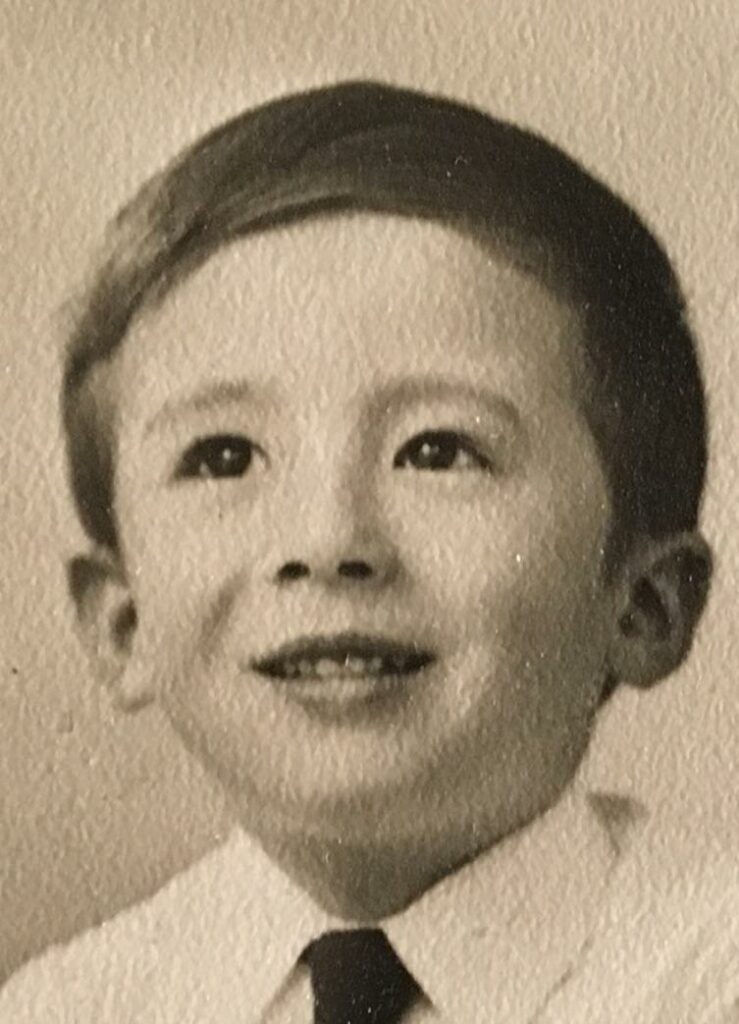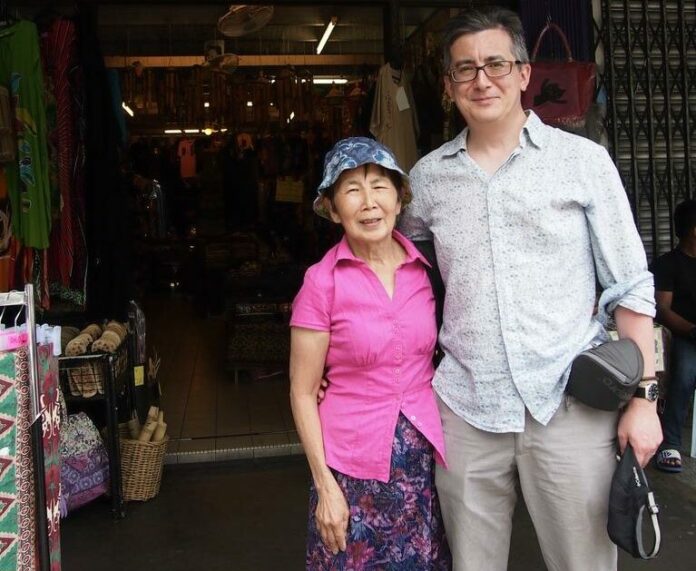|
Getting your Trinity Audio player ready...
|
The Multippl team spoke to Professor Philip Howell, Professor of Historical Geography and Fellow of Emmanuel College, University of Cambridge. Phil is half English, half Malay, and explains that he’s never really recognised himself as Half Asian.
Jump ahead to
A family history
My Chinese Malaysian mother came to the UK from Sarawak in 1958. Like so many others, she came to work in the National Health Service, where she worked as a midwife for many years. The opportunities back home, for a younger daughter in a large, motherless family, were pretty bleak, basically drudgery of the worse kind.
My mum never regretted making that journey halfway around the world, to a country where she knew no one but an older brother. Nor did she regret coming to a city, Nottingham, which experienced in the same year what was called a ‘race riot’, directed against new commonwealth immigrants, and fuelled by the supposed scandal of ‘interracial mixing’.
My dad is English, and his family lived in the East Midlands and the north of England. Farther back, we Howells come from Norfolk, but we think of ourselves as northern, and we don’t care if people further north disagree. We’re certainly not southern: we grew up eating tea at 5, and consuming copious amounts of tea and biscuits to fill us up in the evenings.
I am a proud northerner and a Nottinghamian, though I haven’t lived in the city for over 30 years. My brother and sisters and I were the first in our family to go to university. I was an undergraduate at Cambridge in 1984, and have stayed in the city and University more or less ever since. We look like models of social mobility, representatives of our well-known ‘model minority’ (I realise that the term is controversial).
‘Half Asian’

I would thus be counted as ‘half Asian’, though I’m not a huge fan of the term, and don’t need it to describe myself. In my own mind, I’m fully ‘British’ and fully ‘Chinese’: though I accept as with northern-ness that not everyone would see it that way. If anything, I rather prefer the qualitative ambiguities of ‘Eurasian’ to the fractional precision of ‘half-Asian’.
After all, my mother grew up in a British colony (Malaysia was federated in 1963). She was educated in a Church of England school (interrupted and curtailed by the Japanese invasion). Above all, she was born a British Subject, and entered the UK as a ‘Citizen of the United Kingdom and Colonies’ (this was before the Commonwealth Immigrants Act of 1962 and its ever more restrictive successors). For a good long time, we could argue with Kipling and say that East is not East and West is not West.
One of the problems with these terms like mixed-race/multiracial/biracial/interracial (take your pick amongst these unappealing alternatives) is that they imply some kind of identity crisis. There are plenty of difficulties growing up, but for me, ‘race’ or ethnic difference wasn’t one of them. I don’t think that this is a rose-tinted retrospection, but I was never reminded that I was much different from the people around me.
Growing up
My secondary school had more than a few children of Ukrainian and Polish parents, some with South Asian heritage, as well as a smattering of East Asian and Caribbean kids. It would not compare to a metropolitan comprehensive today, but I still would not have stood out greatly, even with my mum and dad in tow on parent evenings.
I also didn’t and don’t look particularly ‘ethnic’, if we want to use that term. At times I’ve been taken for Spanish, Italian, and even Jewish, to those who looked at me with a keener than usual eye, which is all fine by me. Since I can ‘pass’ for ‘white’ (but not for ‘Asian’), I presumably benefitted from what we would now call ‘white privilege’. All the same, I dislike being casually categorised as (ethnically/culturally) ‘white’. Only half-jokingly, I sometimes put forward ‘white-ish’ as an alternative.
As a child, I might just have looked more ‘Chinese’ than I do now…

Identity and the individual
I’m sorry for the rash of inverted commas, though they’re unavoidable since identity is a political idiom. For me, the tiresome business of ‘who I am’ or ‘where are you from?’ has never been very important, even when occasionally urged on by others.
Some years ago, an academic friend – White, and indeed White minority – chided me for my lack of interest, and instructed me to make more of my non-white heritage. This attitude I found profoundly patronising and insulting.
In general, I hated being told by others who I am and what I should think: clubs and confessions and communities of interest have never had great appeal. The idea of voting collectively has a special horror. I have the same contempt for the insults hurled at people for being insufficiently enthusiastic about their ‘racial’ identity (cf, banana, oreo, etc). None of this is meant to diminish the need for and the importance of collective action; nor do I mean to tell other people what to think. And I accept that other clubs and creeds (the nation, whiteness, Christianity in all its colours) are easily overlooked by those of us who claim to take people as they come.
An interest, not an issue
But still, for me, Chineseness was an interest, not an issue. I didn’t watch TV or films needing to see more people ‘like me’: I enjoyed the TV series The Chinese Detective (1981, an early attempt at diversity), but I preferred Shoestring (1979-80) and even Bergerac (1981-91). I laughed along with the wild adventures of Monkey, Sandy, Pigsy and Tripitaka (Monkey, 1979-), but I liked the ‘Tales of the Arabian Nights’ cartoon segments on Banana Splits better.
Imaginatively, I preferred to holiday in Middle Earth (Tolkien’s racialised depiction of the Haradrim was lost on me, and I was none the worse as well as none the wiser), Gormenghast (I did clock Peake’s Chinese inspirations), and Earthsea (Le Guin’s subtlety on questions of race remains salutary). I don’t suppose I was much different from nerdy boys my age. The only thing I can think of that was exceptional was that I did not and do not much enjoy Vietnam movies – this may be a visceral reaction to images of ‘Asian’ suffering, and it doesn’t hold for other depictions of war.
I was, moreover, never persuaded by the advice to ‘write about something you know’. It is strange to write this right here, but nothing is more uncongenial to me than writing about myself, though I suppose all writing must in some way be.
I have written about race and colonialism, and spent time researching and writing about Hong Kong in the nineteenth century – but none of this came from any kind of direct inspiration, as far as I’m aware. There was no ‘calling’. I have written two historical monographs, one about pet dogs, without needing to actually have any. I mention this whenever I am asked whether I have dogs myself, noting that my other book is about prostitution: the unspoken joke is that I have never been a sex worker either.
So, what I have done in terms of my academic work has been entirely serendipitous, and inconsistent, and that’s just the way I like it.
Ethical questions and lasting connections
I have, nevertheless, continued to teach race and colonial history, hoping to encourage students to take an interest in these questions, and convinced that they should know more about British history, citizenship, and immigration, whether they like it or not. These are vital political and ethical questions, and my own relatively untroubled experience doesn’t take anything away from this conviction.
I am also aware that my siblings have other stories to tell: my brother, for instance, was occasionally nicknamed ‘China’, whether in affection or not (probably not). My sisters remind me of daily racist name calling, so I think I was the lucky one. My mother has also experienced plenty of racism – the most egregious of which was being berated by someone who mistook her for Japanese – ‘people against whom his father had fought in the war’ (I paraphrase this sorry shit). This is particularly ignorant and offensive given that my mother’s family suffered from Japanese aggression as well as growing up in a British colony. Many others, particularly Black Britons, will have sharply different experiences, some of which should shame the rest of us.
But as for my own life, as a ‘half-Asian’? I’d say only that I take a pride in my heritage, and the love and lasting connections that it represents.


